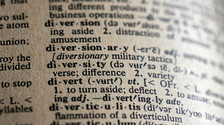Line (*^ω^*)/
difference between じ/ジand ち゛/デ ?
they all are pronounced "ji", but when to use which (I know the difference btw hiragana and katakana use!)..?
like if I should translate somthing from romaji or kanji.. how do I know whom?
7 Thg 10 2010 15:30
Câu trả lời · 5
1
You mean not 'デ' but 'ヂ', don't you?
'デ' is the katakana for 'で'.
Basically you use 'じ' for the dull sound of 'し' and 'ぢ' is the one for 'ち'.
For example you write 'はなぢ' for 'nosebleed' because the word 'はなぢ'
consists in 'はな(nose)' and 'ち(blood)'.
However there are quite a lot of exceptions.
Like 'じめん(ground surface)' is not 'ぢめん' although it should be
'ぢめん' because it consists in 'ち(ground)' and 'めん(surface)'.
In addition, some Japanese don't care the difference of them nowadays
and they tend to use 'じ' even in the case they should use 'ぢ'.
It is better for you to learn 'じ' first and then leran exceptions bit by bit.
For your information, the difference of 'ず' and 'づ' is similar to this case.
'ず' is the dull sound of 'す' and 'づ' for 'つ'.
7 tháng 10 năm 2010
1
Actually, sometimes it's confusing even for native Japanese speakers to decide which one to use.
Good news for you is that most words are written with じ/ジ. In other words, ぢ/ヂ usage is quite limited especially in beginner-intermediate Japanese vocab level.Here are some examples of words written with ぢ/ヂ that you may come across with.
縮む(ちぢむ)
縮める(ちぢめる)
鼻血(はなぢ)
身近(みぢか)
ご飯茶碗(ごはんぢゃわん)
チヂミ
etc.
There is same problem for ず/ズ and づ/ヅ.
Fortunately again, most words are written with ず/ズ.
Rare exceptions are:
小包(こづつみ)
片付ける(かたづける)
お小遣い(おこづかい)
続く(つづく)・続き(つづき)
手作り(てづくり)
三日月(みかづき)
etc.
7 tháng 10 năm 2010
ah, thanks! :D I looked for it but couldn't find it, but now I know! <3 arigatou
7 tháng 10 năm 2010
Btw, that's ヂ, not デ.
On computers, you will get ヂ by typing Di. (But the pronunciation is JI, as you know. )
7 tháng 10 năm 2010
Sorry, I really don't understand your question.
7 tháng 10 năm 2010
Bạn vẫn không tìm thấy được các câu trả lời cho mình?
Hãy viết xuống các câu hỏi của bạn và để cho người bản xứ giúp bạn!
Line (*^ω^*)/
Kỹ năng ngôn ngữ
Tiếng Trung Quốc (Quan thoại), Tiếng Trung Quốc (Đài Loan), Tiếng Anh, Tiếng Nhật, Tiếng Hàn Quốc, Tiếng Na Uy
Ngôn ngữ đang học
Tiếng Trung Quốc (Quan thoại), Tiếng Trung Quốc (Đài Loan), Tiếng Hàn Quốc
Bài viết Bạn Có lẽ Cũng Thích

Traveling for Business: Tips, Tricks, and Essential Advice
3 lượt thích · 1 Bình luận

How Listening Twice Can Boost Your English Skills
5 lượt thích · 2 Bình luận

Top 6 Mistakes to Avoid with Vocabulary Acquisition
52 lượt thích · 17 Bình luận
Thêm bài viết
